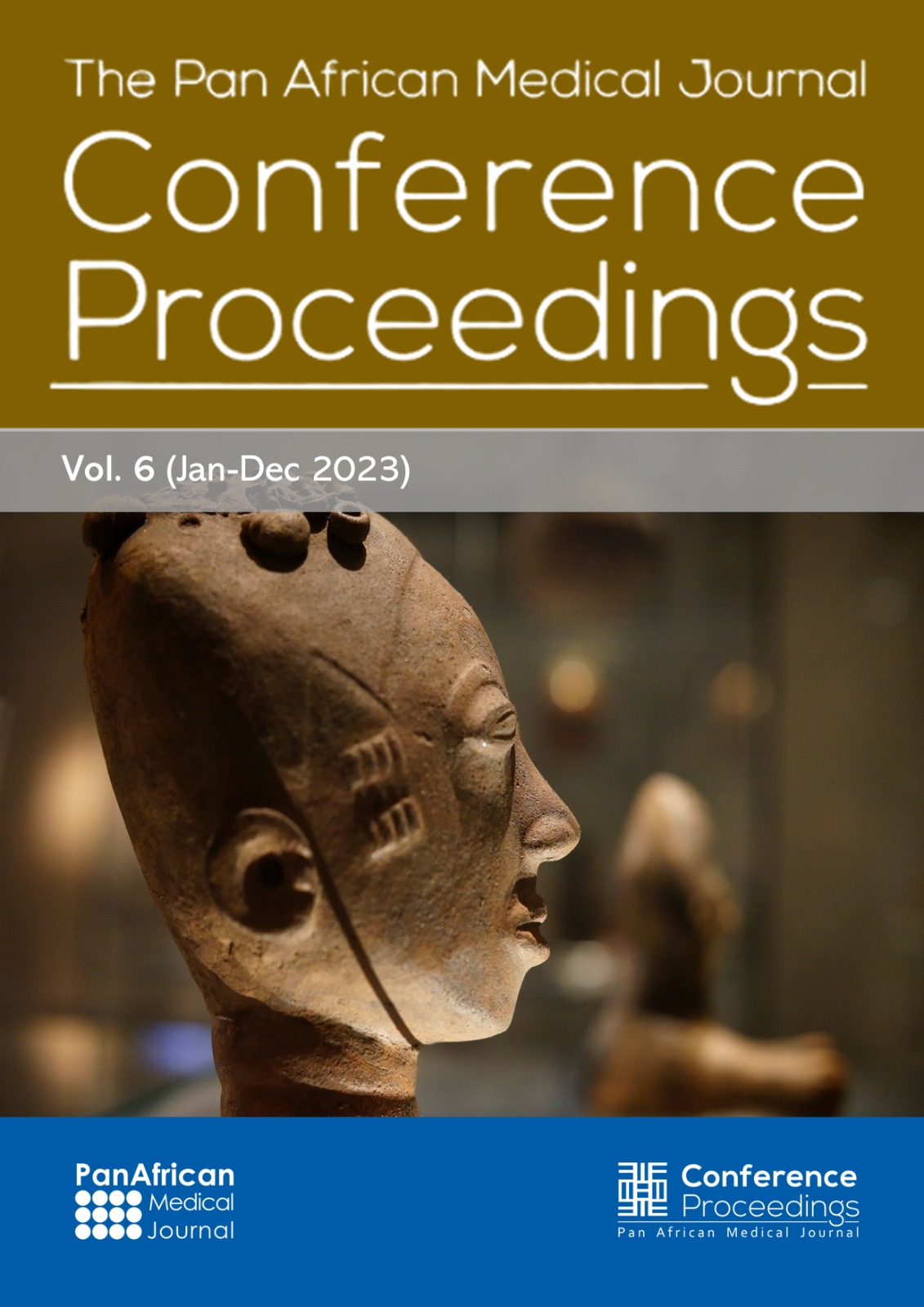Conference abstract
Knowledge and attitudes of population living in rural and semi-rural areas towards COVID-19: case of the Menoua Division, Cameroon
Pan African Medical Journal - Conference Proceedings. 2023:18(35).03
Oct 2023.
doi: 10.11604/pamj-cp.2023.18.35.1980
Archived on: 03 Oct 2023
Contact the corresponding author
Keywords: Knowledge, attitude, Menoua Division, COVID-19, Cameroon
Poster
Knowledge and attitudes of population living in rural and semi-rural areas towards COVID-19: case of the Menoua Division, Cameroon
Zogning Makemjio Émeline1,&, Tiotsia Tsapi Armand1, Défo Tamgno Eric1, Djeunang Dongho Ghyslaine Bruna1, Nguefack-Tsague Georges2, Sanou Sobze Martin3
1Faculty of Sciences and Technology, Evangelical University of Cameroon, Bandjoun, Cameroon, 2Departement of Public Heath, Faculty of Medicine and Biomedical Sciences, University of Yaoundé I, Cameroon, 3Faculty of Medicine and Pharmaceutical Sciences, University of Dschang, Dschang, Cameroon
&Corresponding author
Introduction: the pandemic situation the world has faced caused by the SARS-Cov-2, has upset the population's habits. The limited information available on this infection was a major obstacle to stopping the spread of the virus among the population, particularly in rural areas given the lack of financial and material resources. The aim of this study was to assess the awareness and attitudes of populations living in rural areas to protect themselves against COVID-19 infection in Cameroon.
Methods: a cross-sectional study was conducted from March 9 to April 15 2020 amongst the populations of rural and semi-rural areas of the Menoua Division. Socio-demographic data and COVID-19-related information were collected using a questionnaire administered face-to-face to each participant. The analysis was carried out using the Statistical Analysis System software (SAS version 9.4). The significance threshold was set at a P value of less than 0.05.
Results: a total of 434 participants of which the male majority (sex ratio 1.07) were included in this study. The most represented age group was participants aged [21 - 40] years old (40.29%). Approximately all participants (98.57%) were aware of the world emergency state due to Coronavirus with 75.56%, 91%, and 90.93% knowing respectively that having close contact, kissing, and touching the face with the hands could favor the virus transmission. However, 91.14% were not aware of the clinical symptoms of the disease. The level of awareness varied significantly according to the occupation (p=0.038) and the educational level (p<0.001) of the participants.
Conclusion: the average level of awareness of the population of the Menoua Division on COVID-19 infection was relatively low. Overcoming this pandemic or any future ones means ensuring the flow of the correct information to the population. Community outreach activities focus on clinical manifestations and what to do in case of infection as well as material and financial support should help the population protect themselves effectively against the pandemic, particularly in rural areas and surrounding.
Knowledge and attitudes of population living in rural and semi-rural areas towards COVID-19: case of the Menoua Division, Cameroon
Zogning Makemjio Émeline1,&, Tiotsia Tsapi Armand1, Défo Tamgno Eric1, Djeunang Dongho Ghyslaine Bruna1, Nguefack-Tsague Georges2, Sanou Sobze Martin3
1Faculty of Sciences and Technology, Evangelical University of Cameroon, Bandjoun, Cameroon, 2Departement of Public Heath, Faculty of Medicine and Biomedical Sciences, University of Yaoundé I, Cameroon, 3Faculty of Medicine and Pharmaceutical Sciences, University of Dschang, Dschang, Cameroon
&Corresponding author
Introduction: the pandemic situation the world has faced caused by the SARS-Cov-2, has upset the population's habits. The limited information available on this infection was a major obstacle to stopping the spread of the virus among the population, particularly in rural areas given the lack of financial and material resources. The aim of this study was to assess the awareness and attitudes of populations living in rural areas to protect themselves against COVID-19 infection in Cameroon.
Methods: a cross-sectional study was conducted from March 9 to April 15 2020 amongst the populations of rural and semi-rural areas of the Menoua Division. Socio-demographic data and COVID-19-related information were collected using a questionnaire administered face-to-face to each participant. The analysis was carried out using the Statistical Analysis System software (SAS version 9.4). The significance threshold was set at a P value of less than 0.05.
Results: a total of 434 participants of which the male majority (sex ratio 1.07) were included in this study. The most represented age group was participants aged [21 - 40] years old (40.29%). Approximately all participants (98.57%) were aware of the world emergency state due to Coronavirus with 75.56%, 91%, and 90.93% knowing respectively that having close contact, kissing, and touching the face with the hands could favor the virus transmission. However, 91.14% were not aware of the clinical symptoms of the disease. The level of awareness varied significantly according to the occupation (p=0.038) and the educational level (p<0.001) of the participants.
Conclusion: the average level of awareness of the population of the Menoua Division on COVID-19 infection was relatively low. Overcoming this pandemic or any future ones means ensuring the flow of the correct information to the population. Community outreach activities focus on clinical manifestations and what to do in case of infection as well as material and financial support should help the population protect themselves effectively against the pandemic, particularly in rural areas and surrounding.








